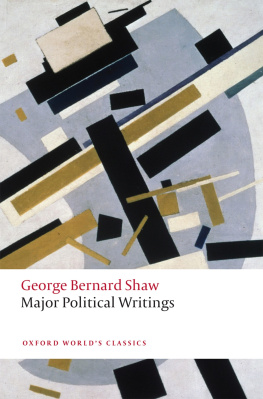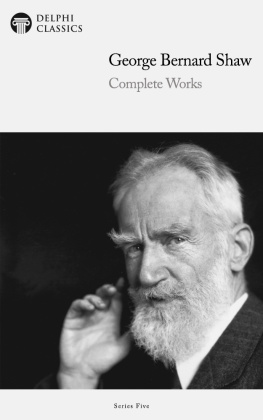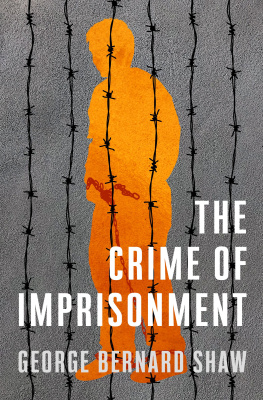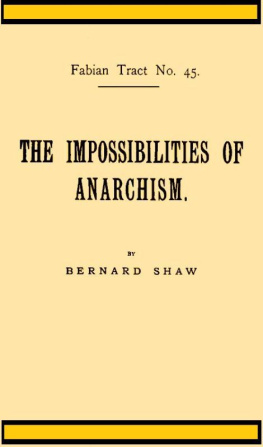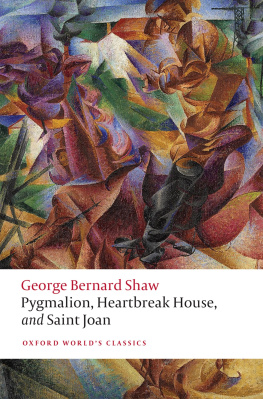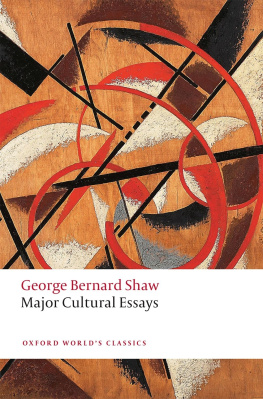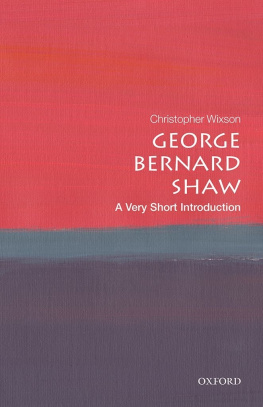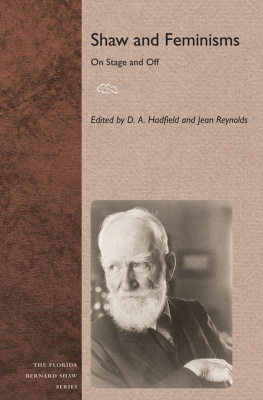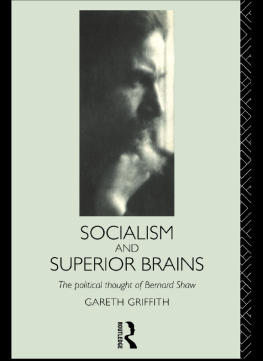George Bernard Shaw was born in Dublin in 1856 into a family of Irelands well-established Protestant Ascendancy. His fathers alcoholism and business ineptitude caused the familys fortunes to decline, and Shaw left school at 15 to work as a clerk in a land agents office. In 1876, he moved to London, where he attended public lectures, joined political and cultural organizations, and, on most days, furthered his learning in the Reading Room of the British Museum. In 1884, he became a member of the newly founded Fabian Society, which was devoted to political reform along socialist principles, and remained one of their leading pamphleteers and campaigners for much of his life. Starting in the mid-1880s, Shaw worked variously as a book, music, art, and theatre reviewer, and this cultural criticism formed the basis of his important studies The Quintessence of Ibsenism (1891) and The Perfect Wagnerite (1898). He began playwrighting in earnest in the early 1890s, with Widowers Houses (1892), but his early plays were largely unperformed as they did not conform with the commercial theatres demands for musicals, farces, and melodramas. Shaw finally found success in New York in 1898 with The Devils Disciple (1897). With the windfall from the production, he retired from journalism and married Irish heiress Charlotte Payne-Townshend. In the new century, Shaw embarked on forging a theatre of the future, transforming the problem and discussion play into a theatre of ideas with Man and Superman (1903), John Bulls Other Island, and Major Barbara (1905). The popular writer of Fannys First Play (1911) and Pygmalion (1912) became a pariah following his condemnation of jingoistic patriotism at the outset of the First World War. His comeback was slow but he achieved worldwide acclaim as the writer of Saint Joan (1923) and was awarded the 1925 Nobel Prize for Literature. He continued to write plays, including The Apple Cart (1928) and Geneva (1936), but his output dropped off significantly in the 1940s. Shaw died at his home in Ayot St Lawrence in 1950.
Elizabeth Carolyn Miller is a Professor of English at the University of California, Davis and a specialist in nineteenth- and early-twentieth-century literature of the British Empire. She is the author of Slow Print: Literary Radicalism and Late Victorian Print Culture (Stanford University Press, 2013), which was named Best Book of the Year by the North American Victorian Studies Association, and Framed: The New Woman Criminal in British Culture at the Fin de Sicle (University of Michigan Press, 2008). Recent editing projects include a special issue of Victorian Studies on Climate Change and Victorian Studies, and a co-edited collection titled Teaching William Morris (Fairleigh Dickinson University Press, 2019).
oxford worlds classics
For over 100 years Oxford Worlds Classics have brought
readers closer to the worlds great literature. Now with over 700
titlesfrom the 4,000-year-old myths of Mesopotamia to the
twentieth centurys greatest novelsthe series makes available
lesser-known as well as celebrated writing.
The pocket-sized hardbacks of the early years contained
introductions by Virginia Woolf, T. S. Eliot, Graham Greene,
and other literary figures which enriched the experience of reading.
Today the series is recognized for its fine scholarship and
reliability in texts that span world literature, drama and poetry,
religion, philosophy and politics. Each edition includes perceptive
commentary and essential background information to meet the
changing needs of readers.

Great Clarendon Street, Oxford, ox2 6dp, United Kingdom
Oxford University Press is a department of the University of Oxford. It furthers the Universitys objective of excellence in research, scholarship, and education by publishing worldwide. Oxford is a registered trade mark of Oxford University Press in the UK and in certain other countries
Editorial material Elizabeth Carolyn Miller 2021
Chronology Brad Kent 2021
The moral rights of the authors have been asserted
First published as an Oxford Worlds Classics paperback 2021
First Edition published in 2021
Impression: 1
All rights reserved. No part of this publication may be reproduced, stored in a retrieval system, or transmitted, in any form or by any means, without the prior permission in writing of Oxford University Press, or as expressly permitted by law, by licence or under terms agreed with the appropriate reprographics rights organization. Enquiries concerning reproduction outside the scope of the above should be sent to the Rights Department, Oxford University Press, at the address above
You must not circulate this work in any other form and you must impose this same condition on any acquirer
British Library Cataloguing in Publication Data
Data available
ISBN 9780198816591
ebook ISBN 9780192548559
Printed and bound in Great Britain by
Clays Ltd, Elcograf S.p.A.
ACKNOWLEDGEMENTS
I wish to offer thanks to those colleagues who helped me chase down some of Shaws references for this volumes annotations, especially Benjamin Kohlmann, Lindsay Wells, Philip Steer, and members of the victoria listserv who responded to stray queries. Many thanks also to series editor Brad Kent for his assiduous guidance, and to three graduate student research assistants who provided crucial support: Jennifer Tinonga, William Hughes, and Rebecca Kling. Thanks, as always, to my familyMatthew, Ambrose, and Giacomowhose love is the foundation for every project I undertake.
CONTENTS
George Bernard Shaw was once the most widely read socialist writer in the English language, and a new collection of his major political writings presents an opportunity to reflect on the influential position he once held as a public intellectual and on the continuing legacy of his political work. The widespread popularity and high sales The thorough interpenetration of Shaws literary and political careers is an unusual story in modern literature, and this volume offers a portrait of Shaw as a political artist in the purest possible sense: that is, as a writer of essays, articles, pamphlets, and books with explicitly and expressly political aims.
The writings featured in this collection speak to all or at least most of Shaws major areas of political intervention, from his consuming focus on value and rent in his early career to his emphasis on equality of income toward the end; they are also inclusive of the various venues and forms in which his political work appeared: periodical publications, pamphlets, and free-standing books. Shaw had a famously long career that was marked by relentless, non-stop labour, which, after he had achieved a certain degree of notoriety, kept him always in the public eye. Political writing was one genre that he stuck with for the whole of this career, from his earliest contributions in the socialist press to late works such as Everybodys Political Whats What, written when he was nearing 90. Novel writing he gave up early; drama he came to after about ten years of toil as a London journalist; but political writing occupied him for the whole of his career. Even when addressing the driest of topics, Shaws style was never dry, and in reviewing his work as a political artist we are reminded that his political writing was deeply coloured by his experience as a public speaker and as an orator on behalf of the socialist cause. He spent decades talking to audiences about socialism, and by all accounts was quite persuasive: as literary critic Katherine E. Kelly notes, his devotion to Fabian public speaking both in London and in the provinces coincided with a near tripling of London Fabian memberships. He was, perhaps, accustomed to the more immediate response that a live audience was capable of offering, and one can often sense this in his prose writings, which make use of humour, self-reference, and shock effects in ways that recall his career on the stump. Shaws writerly persona, which was relatively consistent throughout his career, was honed in the lecture hall, and he never abandoned the particular voice of cajoling persuasion that he adopted there.

